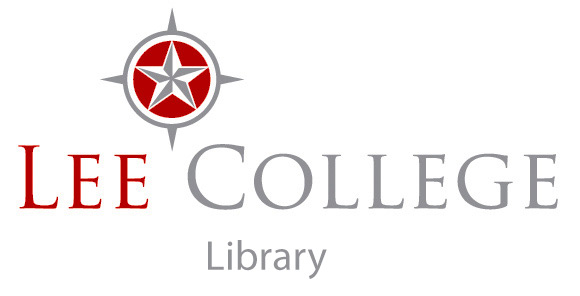Ask a Lee Librarian
Summer 2024 Library Service
All of the library's electronic resources, including articles, e-books and streaming video, continue to be available to Lee College students and employees 24/7.
- Library website: www.lee.edu/library
- When accessing resources off-campus, you will be asked for a user name and password. The user name will be your id number and you may need to be set or reset your password if you have not logged in in a while.
May Mini Hours:
- M-Th: 7:30 AM - 7:00 PM
- Fr: 7:30 AM - 12:30 PM
- Sa: Closed
- Su : Closed
Summer Closures:
- Mon, May 31st (Memorial Day)
- Wed, June 19th (Juneteenth)
- Thurs, July 4th (Independence Day)
Contact us via:
- Email: library@lee.edu
- Phone: 281-425-6379
- Text: 281-789-6286
-
Library Staff DirectoryContact one of our staff members directly.
Resources for finding articles
-
Academic Onefile (Gale) This link opens in a new windowContains journal, magazine & newspaper articles from a variety of disciplines.
-
JSTOR This link opens in a new windowIncludes journal from many disciplines, including the humanities and social sciences.
-
Opposing Viewpoints in Context This link opens in a new windowArticles & position pieces that cover current events and controversial topics from magazines, journals and newspapers.
The following publications can be found in the library databases with the exception of Internet Sites. They each have strengths and weaknesses depending on the type of information you are seeking.
- Internet Sites:
- Easily findable, using search engines already on your devices.
- Require more analysis on your part to determine if they are reliable.
- Newspapers:
- Provide current information about topics that may not have made it into journal articles yet.
- More likely to provide information on local news and issues.
- Stories sometimes go to print very quickly ; events may have important developments that occur after publication that are not included.
- Articles tend to be shorter and less in-depth than magazine or journal articles.
- Popular Magazines:
- Geared to the popular reader.
- Frequently articles do not include citations to verify facts included in the articles.
- Content may be influenced by advertisers.
- Trade publications:
- Professional Association information in them
- Continuing Education resources
- Frequently useful for job searching.
- May use jargon and assume that readers have background knowledge on the industry.
- Topics are limited to a particular industry.
- Scholarly publications:
- Peer reviewed
- Generally more thoroughly researched.
- Much slower publication rate
- Topics of journal articles are typically limited to a narrow subject range.
- Writers may be more concerned with their the content of their articles than with readability.




What is the difference between a journal and an article?
- In a research context when a professor asks for a journal they are usually referring to a scholarly periodical. For a definition of a scholarly periodical see below.
- An article is a piece of writing included with others in a newspaper, magazine, or journal. Articles are what make up journals, magazines, and newspapers.
Scholarly Periodicals – Journals
- written by and for researchers and scholars
- includes full citations
- peer-reviewed(articles are viewed by specialists before published)
- authors are not paid
- sometimes called academic articles or peer-reviewed articles
Popular Periodicals – Magazines
- written by journalists or professional writers
- rarely give citations
- written for the general public
- generally shorter articles
- advertisements
Tailor the level of your supporting sources to your audience and topic:
- Consider the purpose of your research: are you attempting to persuade your audience? Inform them?
- Are you in search of hard facts? Interpretations of facts?
- What level of supporting evidence will your audience expect?
- Would it differ, for example, if you were giving a talk at your church or house of worship vs. to the Board of Regents of the college?
- More technical topics call for more rigorous research.
- Research sources exist on a spectrum of intellectual rigor and research quality -- very few are definitely good or bad. A particular source might be inappropriate for a particular project, though.
- If in doubt, ask your professor.
Choosing your topic
- Research is a process of inquiry.
- You should be able to frame your research topic as a question, i.e., “What has George H.W. Bush done to improve everyday Americans’ lives?” or, “How did toothpaste come to be so essential to the American hygiene routine?”
- List some search terms you might use. T
- Then think of some synonyms for those search terms. You will get different articles if you search for the words, “dog food,” than you will if you search using the word “kibble,” even though they may mean the same thing.
-
Framing your topic worksheetThe above document contains questions you can use to pin down your topic and think of some search terms to use in the databases. It is not necessary to use this form every time you do research, but you should be going through these things in your head every time you start a research project.


